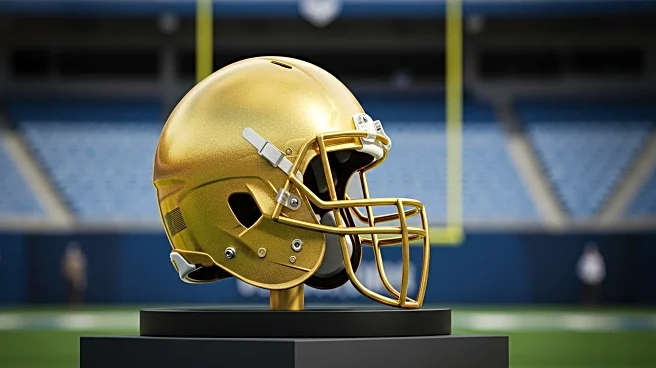What is the story about?
What's Happening?
Rich Rodriguez, a prominent figure in college football, has returned to West Virginia University (WVU) as head coach after a 17-year absence. His departure in 2007 to coach at the University of Michigan was controversial, leading to vandalism of a sign in his hometown of Grant Town, West Virginia, that honored him. The sign has since been restored following his rehiring. Rodriguez's return is marked by a desire to revive WVU's football program and mend past grievances. His previous tenure at WVU was successful, but his departure left many feeling betrayed. Now, both Rodriguez and the community are looking to move forward and achieve success once again.
Why It's Important?
Rodriguez's return to WVU is significant for both the university and the local community. His previous success at WVU brought national attention to the program, and his return could potentially restore the team's competitive edge. For the community, it represents a chance to heal old wounds and embrace a figure who was once a source of pride. The move also highlights the complex relationship between sports figures and their communities, where professional decisions can have lasting personal impacts. If successful, Rodriguez's return could serve as a redemption story, benefiting the university's reputation and potentially boosting local morale and economic activity through increased sports tourism.
What's Next?
Rodriguez will focus on rebuilding the WVU football program, aiming to replicate or surpass his previous achievements. The community and university stakeholders will be watching closely to see if he can deliver on the promise of revitalization. Success on the field could lead to increased support from fans and alumni, as well as potential recruitment advantages. However, any setbacks could reignite past tensions. The upcoming football season will be a critical period for Rodriguez to demonstrate his commitment and capability to lead WVU to new heights.
Beyond the Headlines
Rodriguez's return also raises questions about forgiveness and the long-term impact of professional decisions on personal relationships. It underscores the potential for reconciliation and the power of sports to unite communities. Additionally, it highlights the pressures faced by coaches in high-stakes environments and the expectations placed on them by both fans and institutions. The situation at WVU could serve as a case study in sports management and community relations.

















